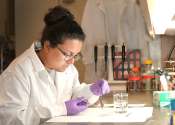The 'fuel of evolution' is more abundant than previously thought in wild animals
Darwinian evolution is the process by which natural selection promotes genetic changes in traits that favor survival and reproduction of individuals. How fast evolution happens depends crucially on the abundance of its "fuel": ...









